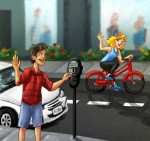I get it, the street needs to be cleaned. What I don’t get is why I need a $70 ticket on days when a street-cleaning vehicle is nowhere in sight, apparently replaced with an army of parking officers.
Thankfully, the Los Angeles Parking Reform Working Group – tasked by Mayor Eric Garcetti with finding solutions to parking problems in Los Angeles – agrees with me.
The LAPRWG released a report that outlined six different recommendations to improve L.A. parking, covering topics such as violation fees, street cleaning, handicapped parking and street meters. The report was presented last week to the Los Angeles City Council Transportation Committee and was opened to the public for feedback. Now the committee needs to decide which of the suggestions it will attempt to make law.
It is important that the City Council considers all suggestions seriously but, considering the breadth of the suggestions in LAPRWG’s proposal, the main focus needs to be on reducing fines for nonsafety-related violations and revamping street-cleaning procedures, because this is what will help low-income residents the most.
As it stands, low-income residents of Los Angeles are much more likely to get tickets because they generally live in denser areas where there is very limited parking, and moving vehicles regularly for street cleaning can be a challenge. Wealthier neighborhoods generally have relaxed street parking that’s often protected by permits. This is a struggle that many students with cars understand well.
Those who are financially disadvantaged are also disproportionately hurt by outrageous fees for nonsafety-related violations because these fines are more difficult for low-income residents to deal with. A single street-cleaning violation right now costs over three times more than the median hourly wage in Los Angeles. Angelenos who have trouble paying the fine immediately can also find themselves stuck with late fees that double the price of the original ticket. Essentially, this means that many low-income residents end up paying even more than wealthier residents who can pay the fees right away.
The suggestion by LAPRWG that most directly addresses the needs of these low-income Angelenos is enticing in both its effectiveness and simplicity: drastically cut the fines for all parking violations that do not affect public safety.
According to LAPRWG, fines for nonsafety-related violations should start at $23 to match the median hourly income of residents and increase for every violation of the same kind in the same year, reaching a maximum of $68 in four tiers. Officials say this would actually increase the number of people who pay their tickets, offsetting the total revenue lost due to lower ticketing fees.
The next most effective way to lower the amount residents pay in ticketing costs is to reduce the number of unnecessary tickets.
According to the LAPRWG, street-cleaning violations are the most common parking violations, with approximately 630,000 tickets given in less than a year. To reduce the number of tickets given for this reason, LAPRWG would have the city use GPS trackers on street-cleaning vehicles to reduce friction with residents’ lives. The ideas here are simple: If your street isn’t being cleaned on a specific day, no matter what the signs say, you won’t get a ticket. Moreover, on days when the street is being cleaned, location tracking will allow street parking to be unavailable for shorter periods of time. Lastly, street-cleaning schedules in general will be shifted by a few hours, in order to avoid overlapping with the needs of most working residents.
In low-income, resident-dense areas, having shorter street closures and no unnecessary enforcement will go a long way in helping residents avoid trouble.
Given the benefits and the low cost of implementation, it’s hard to justify why street-cleaning changes shouldn’t take place. According to the LAPRWG report, the Bureau of Street Services – which operates the street-cleaning vehicles in Los Angeles – admits that it could put the GPS tracking devices on the majority of its fleet by the end of the fiscal year if it is given the funding to do so. And the cost to deploy the technology, according to the bureau, would be marginal compared to its overall budget.
It’s not difficult to understand why the city might be reluctant to pass measures that reduce the number of fines. Parking tickets currently generate $165 million worth of revenue for the city, and that number is expected to grow in the next few years.
Cities need revenue, but now with Los Angeles’ rainy day fund reaching $440 million, city officials clearly have a chance to level the playing field for low-income residents who are disproportionately hurt by the current practices.
At the end of the day, there are a ton of suggestions in the LAPRWG report, and it’s almost impossible for the city to undertake all of them. As such, it’s important that we keep city officials pointed toward the ones that will bring the biggest benefit to the people who need it most.
Otherwise, we could find ourselves in the next election cycle listening to the radio on the way to work, hearing politicians talk about how they reformed parking while wondering how to pay the parking fine we just got that morning.

Thank you for the illuminating illustration to this disappointing article. The text is about parking (“On Parking”) , and identifies some serious problems in the universe of parking and parking fines. But what is parking? Parking is just the tip of a complicatd iceberg which is called transportation. If you want to resolve parking problems, you NEED to think about transportation. Kelly Brennan’s picture does exactly that. She is the one who shows us the happy cyclist who lives a different transportation world, one which seems entirely outside of Ara Shirian car-focussed world view.
Can we please have more writing about transportation, and less writing of the parking? And fewer voices that are glued to the dashboard. Thanks Kelly for pointing the way!